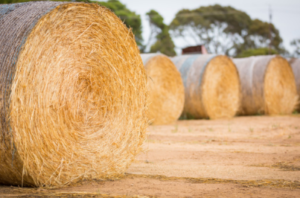What Is Baler Twine?
Baler twine is a type of string used to secure hay bales together. It comes in various colours and weights to meet different requirements.
 Farmers and ranchers will find this tool indispensable during the hay season. Not only does it assist with tying bales of hay, but it has many other applications.
Farmers and ranchers will find this tool indispensable during the hay season. Not only does it assist with tying bales of hay, but it has many other applications.
Polypropylene
Polypropylene baler twine Australia (binder twine) secures hay bales. This strong and lightweight material can be employed in many ways on the farm, from repairing fences to attaching tractor parts; its versatility has many practical and creative uses.
Polypropylene baler twine Australia, although plastic, is biodegradable and recyclable – making it the ideal choice for farms and equine facilities looking to meet their CSR obligations.
Quality baler twine will have high tensile and knot strength and be made from eco-friendly polypropylene. It gives the material the necessary elasticity and resilience to handle hauling stresses while being easily cut for cutting purposes.
To achieve high tensile strength, twine is melted and then cooled to reduce internal stresses before wounding into coils. After tempering the coils, they are packed into coils for sale and palletised for protection.
Twine can be customised to the user and the equipment it will be fitted in, though the most popular colour is black. This choice proves exceptionally durable in countries with high levels of solar radiation exposure.
Sisal
Sisal baler twine Australia is an environmentally friendly product made of individual strands of plant fibres twisted together. It is an excellent choice for farmers since it does not harm your environment or crops.
Sisal twine comes in various weights and colours, making it the ideal solution. Not only is it durable and dependable, but also safe for the environment and animals.
It is strong enough to repair fences and certain tractor parts and hold a wall in place – making it an invaluable addition to any farm or ranch operation.
Sisal twine is the most widely used material for tying hay bales together. Generally green in colour and treated against rot, mildew and rodents, this twine is also biodegradable and easy to work with.
Sisal twine is an indispensable household product in drawers or shelves. In addition, this biodegradable twine is an excellent option for farmers and agricultural contractors looking to use traditional baling twine in their operations.
Cooking twine is indispensable when trussing a chicken or other food items in the oven. Not only will it keep your roast secure and prevent it from falling apart, but it’s also great for tying down wire tree baskets or other items that require securement.
Twine is available in various plys, such as 1-ply, 2-ply and 3-ply. This strong yet economical workhorse twine comes in 10 lb centre pull cartons or 50 lb bulk reels for convenient storage.
This sisal twine is designed explicitly for square balers and features extra-long fibres to guarantee consistent baling, uniformity and proper length. In addition, it’s fully treated to resist rodents and insects while providing high tensile and knot strength.
Biodegradable
Agriculture producers typically utilise baling machines during harvest time to bind and wrap hay into bales that will be transported for storage later. Various twine and net wrap can tie hay or other forage into these bales securely; sisal-based or synthetic twine is the most popular.
Biodegradable baler twine is an attractive option that offers superior performance and cost efficiency. These products have a tensile strength similar to sisal, yet they’re made with plastic so that they can be recycled or disposed of quickly.
The primary distinction between sisal and other baler twine is that sisal is a natural fibre composed of individual strands of plant materials twisted together. It is biodegradable and will eventually break down in the ground.
These twines have been treated to resist rotting and insect or animal problems, making them an ideal choice for any baler operator. They are solid and easy to handle, but their versatility extends beyond hay-related tasks – they can be used on any farm!
Hay-bound twines and net wraps often lack biodegradability or composability, which can have negative environmental consequences. Unfortunately, many of these materials are on the ground or caught in agricultural machinery. Furthermore, some twines and net wraps may not be digestible by animals which could result in adverse health effects.





Comments are Disabled